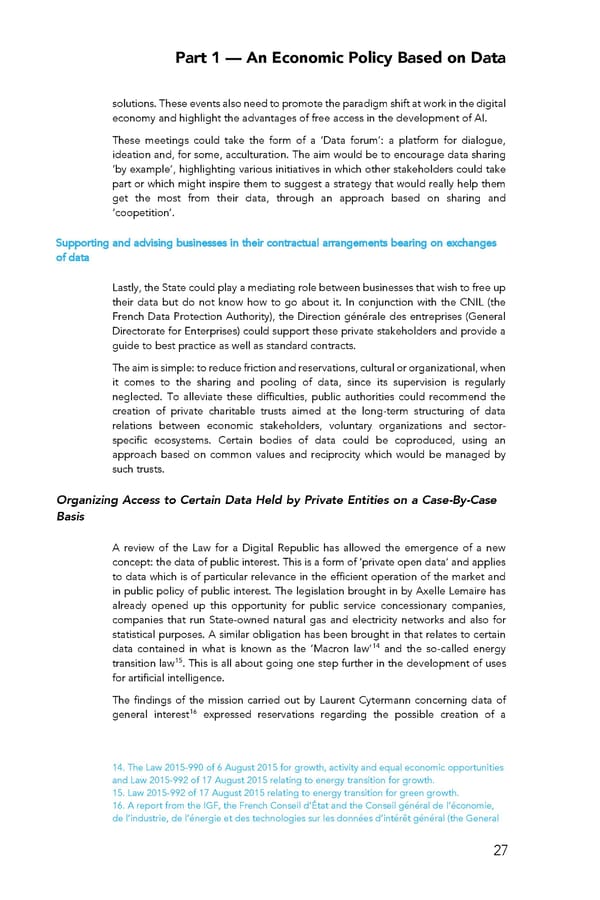Part 1 — An Economic Policy Based on Data solutions. These events also need to promote the paradigm shift at work in the digital economy and highlight the advantages of free access in the development of AI. These meetings could take the form of a ‘Data forum’: a platform for dialogue, ideation and, for some, acculturation. The aim would be to encourage data sharing ‘by example’, highlighting various initiatives in which other stakeholders could take part or which might inspire them to suggest a strategy that would really help them get the most from their data, through an approach based on sharing and ‘coopetition’. Supporting and advising businesses in their contractual arrangements bearing on exchanges of data Lastly, the State could play a mediating role between businesses that wish to free up their data but do not know how to go about it. In conjunction with the CNIL (the French Data Protection Authority), the Direction générale des entreprises (General Directorate for Enterprises) could support these private stakeholders and provide a guide to best practice as well as standard contracts. The aim is simple: to reduce friction and reservations, cultural or organizational, when it comes to the sharing and pooling of data, since its supervision is regularly neglected. To alleviate these difficulties, public authorities could recommend the creation of private charitable trusts aimed at the long-term structuring of data relations between economic stakeholders, voluntary organizations and sector- specific ecosystems. Certain bodies of data could be coproduced, using an approach based on common values and reciprocity which would be managed by such trusts. Organizing Access to Certain Data Held by Private Entities on a Case-By-Case Basis A review of the Law for a Digital Republic has allowed the emergence of a new concept: the data of public interest. This is a form of ‘private open data’ and applies to data which is of particular relevance in the efficient operation of the market and in public policy of public interest. The legislation brought in by Axelle Lemaire has already opened up this opportunity for public service concessionary companies, companies that run State-owned natural gas and electricity networks and also for statistical purposes. A similar obligation has been brought in that relates to certain data contained in what is known as the ‘Macron law’14 and the so-called energy transition law15. This is all about going one step further in the development of uses for artificial intelligence. The findings of the mission carried out by Laurent Cytermann concerning data of 16 general interest expressed reservations regarding the possible creation of a 14. The Law 2015-990 of 6 August 2015 for growth, activity and equal economic opportunities and Law 2015-992 of 17 August 2015 relating to energy transition for growth. 15. Law 2015-992 of 17 August 2015 relating to energy transition for green growth. 16. A report from the IGF, the French Conseil d’État and the Conseil général de l’économie, de l’industrie, de l’énergie et des technologies sur les données d’intérêt général (the General 27
 For a Meaningful AI - Report Page 27 Page 29
For a Meaningful AI - Report Page 27 Page 29